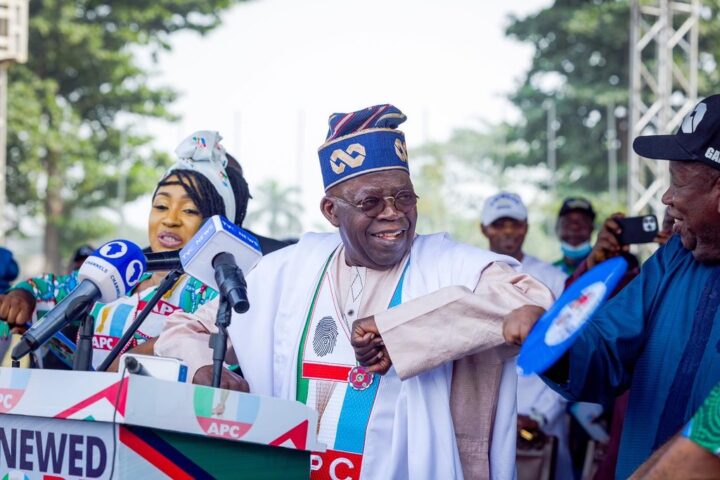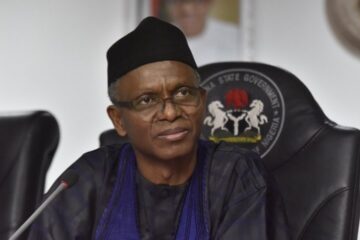Tinubu enters the week of gràgrà [OPINION]

Tinubu
By Abimbola Adelakun
Every government transition begins with a week of gràgrà where the new helmsman tries to assert their power by making definitive executive decisions. The week of gràgrà is when new leaders dis-anchor from the old. This phase, where the cliches of a “new beginning” are still being belted out, is where the newly enthroned must make a show of breaking with the past. That move is necessary because power transitions are not only political-legal affairs but also ethical.
Nigeria’s brand of politics demands that such demonstration of autonomy be ostentatious. Our zero-sum politics does not afford generosity in victory; one must also obliterate the defeated. To carry over from an outgoing leader is to inherit the ghosts of their rulership. In bygone empires, such housecleaning consists of dispatching with the abobakú, the king’s surrogate, whose death eliminates as many of the vestiges of the old rule as possible.
Our modern empires run by supposedly democrats are not essentially different. People get into power not merely through a competitive election but through shadow warfare too. Because elections are the means of calibrating the worth of political actors, they cannot but be a war. Even victory itself is the beginning of another war. The defeated must not be allowed to survive; they must be destroyed politically and morally. Otherwise, one would labour under the weight of their achievements. In our clime, to complete a project your predecessor started is to risk sneers that you are incapable of generating original ideas. To abandon such projects is to be criticised for wasting the resources already invested. One way to override the conundrum of taking on usually white elephant projects started by your predecessor (and burdened by bloated receipts) is to destroy the initiator itself.
In anticipation of this bile, some outgoing politicians sow disaffection for their successors by making a trailer load of appointments right before their exit. If the successor goes forward with the stuffed payroll, they could end up accommodating their predecessor’s loyalists along with any potential for mischief. If they reverse such appointments, they would be labelled as the evil person who took food away from people’s mouths.
In 2015 when former President Muhammadu Buhari got into office, his week of gràgrà comprised of sniffing into the sewers of comatose bureaucracies to dig out cases of corruption spectacular enough to make sensational headlines but which, when stripped to details, would not implicate those whose dirty money sponsored his ride to Aso Rock. Remember, that was the season the Economic and Financial Crimes Commission turned itself into a street dancer, entertaining us with astounding discoveries of money in unusual places. For all that gràgrà, what is the anti-corruption scorecard under Buhari?
I still clearly remember where I was in July 2015 when former-labour-activist-former-governor-turned-dissembler Adams Oshiomole claimed that on a trip to the USA, some officials informed them that a single minister stole $6bn under President Goodluck Jonathan’s watch. Even for a country where people routinely pull figures out of their derriere, that amount sounded improbable and outright nonsensical. But then, those kinds of stories do not need to be factual. They only need to be believed.
For the newly inaugurated government, the week of gràgrà started with the ongoing energy crisis fuelled by the uncertainty of what will become of the much-disputed subsidy. Buhari, ever an artful dodger of responsibility, left the problem for his successor to resolve (or not). Managing it will be difficult because it would also entail the question of how to properly narrate the failures of their predecessor in that regard. They will need to extricate themselves from Buhari’s baggage so they can start on a new note, and at the same time, the APC-APC transition must be seen as truly continuous.
They struggled with a similar conundrum during their electioneering. To carve themselves in the electoral campaigns as different from the All Progressives Congress government was to be disingenuous, risk the ire of Buhari and his loyalists, and damage themselves from the outset. To present themselves as continuous with Buhari was to own his failures. It was—and still is—a tenuous balance for Tinubu. Given the support that Buhari offered him, how does his administration move on from Buhari and his unwise decisions without starting itself on a sour note? I will not be surprised if Tinubu absorbs the failures of his predecessor on the fuel subsidy issue and suspends the implementation indefinitely.
Purging Buhari’s ghosts from a Tinubu’s Aso Rock will be hard. Unlike 2015 when there was an “enemy” against whom Buhari could establish its anti-corruption bona fides, the 2023 transition was between old friends. After eight years of Buhari, I am not sure even their own party loyalists want to ever hear them moaning about “16 years of the PDP!” again forever. They must find another excuse that will resonate. Unfortunately, Buhari is already ahead of them on that. When Tinubu went to present his Certificate of Return to Buhari in Daura in March, one of the things that man said was that his achievements in office galvanised Tinubu’s victory (a claim also repeated by Buhari’s minister, Tunde Fashola). Buhari was not delusional; he put his successor in a moral bind.
Mind you, Nigerians are not unaware of the degree of the damages done to the polity—they bear the worst part of it, after all—but the Tinubu administration will never be able to speak fully of the degree to which Nigeria was denuded in the last eight years. If they find outrageous instances of misappropriated public funds, they cannot rush to the press. They can hardly afford to shatter whatever is left of the man’s myth, especially since they spent the past few weeks singing his praises. The week of gràgrà, where a new leader gets to reel out a list of their predecessor’s sins, is where Tinubu refurbishes Buhari’s worthless legacy.
Unlike 2015, it will be too imprudent of them to regale us with stories of finding secret stashes of money in graveyards or water tanks. Such strategies will fail because Buhari not only used those tricks until they became trite, but it would be outrightly laughable for an administration headed by a Tinubu to pretend it has any moral ground to stand on to challenge corruption. From the look of things, we might even be spared the tiring vulgarity of the EFCC crashing into homes at midnight to arrest people. Anything that goes wrong with the economy or security cannot be glibly blamed on the past leadership. Buhari has managed to seize the narrative by reporting his failures as successes, getting his successor to assent, and linking the life of his administration to theirs. They accepted the “past perfect” he chronicled for them; when the present tenses, it could only be because of their (un)doing.
One day, Buhari’s biographers will claim that he bequeathed the country with a parting gift of Nigeria Air. And if by this time next year, that single plane they launched last week is not yet crisscrossing the skies, those who let him get away with the farce will own the failure.
If the transition had happened between two different parties, Tinubu’s camp would have had a jolly good time refuting Buhari’s legacy. Now they are stuck with promoting Buhari’s phony achievements, mopping up his messes, and propping up his empty achievements. Looking at it now, you realise that Buhari might have been a clueless buffoon for eight years, but he knew what he was doing when he supported Tinubu. The Tinubu team of propagandists who used the tools of their trade to finish off Jonathan in 2015 presently stands down on Buhari’s matter. The best the boldest among them can do with their fanged tongues is to speak here and there.
Culled from The Punch











